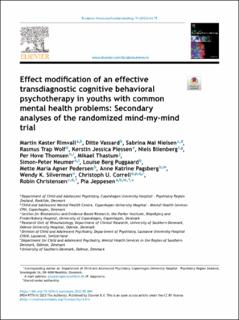| dc.contributor.author | Rimvall, Martin Køster | |
| dc.contributor.author | Vassard, Ditte | |
| dc.contributor.author | Nielsen, Sabrina Mai | |
| dc.contributor.author | Wolf, Rasmus Trap | |
| dc.contributor.author | Plessen, Kerstin J. | |
| dc.contributor.author | Bilenberg, Niels | |
| dc.contributor.author | Thomsen, Per Hove | |
| dc.contributor.author | Thastum, Mikael | |
| dc.contributor.author | Neumer, Simon-Peter | |
| dc.contributor.author | Puggaard, Louise Berg | |
| dc.contributor.author | Pedersen, Mette Maria Agner | |
| dc.contributor.author | Pagsberg, Anne Katrine | |
| dc.contributor.author | Silverman, Wendy K. | |
| dc.contributor.author | Correll, Christoph U. | |
| dc.contributor.author | Christensen, Robin | |
| dc.contributor.author | Jeppesen, Pia | |
| dc.date.accessioned | 2023-09-05T08:08:52Z | |
| dc.date.available | 2023-09-05T08:08:52Z | |
| dc.date.created | 2023-08-24T10:57:32Z | |
| dc.date.issued | 2023 | |
| dc.identifier.citation | European Neuropsychopharmacology. 2023, 74 64-75. | en_US |
| dc.identifier.issn | 0924-977X | |
| dc.identifier.uri | https://hdl.handle.net/11250/3087408 | |
| dc.description.abstract | Mind My Mind (MMM) cognitive behavioral therapy (CBT) manualized treatment is effective in the management of common emotional and behavioral mental health problems in youth, yet not all individuals respond satisfactorily to treatment. This study explored potential effect modifiers, i.e., baseline factors associated with a differential treatment effect. We conducted secondary effect modifier analyses with MMM trial data, which involved randomization of 396 youths aged 6–16 years to either MMM CBT treatment (9–13 sessions) or management as usual in local community settings. We examined sociodemographic- (sex, age, family composition, ethnicity, parental education, and income) and clinical variables (mental disorders and duration of mental health problems) as potential effect modifiers of the a) change in parent-rated impact of mental health problems measured by the Strengths and Difficulties Questionnaire (SDQ) or b) response (reduction of ≥1 on SDQ-impact). In intention-to-treat analyses, superior treatment (net) benefits from the MMM intervention were found among youths who met criteria for any mental disorder at baseline (-1.25 [95%CI: -1.67;-0.82]) compared to youths that did not meet diagnostic criteria (-0.22 [95%CI:-1.09;0.65]). Comorbidity vs no comorbidity (-1.84 [95%CI:-2.58;-1.10] vs -0.72 [95%CI:-1.15;-0.29]) and longer duration of untreated mental health problems, i.e., more vs less than 6 months (-1.16 [95%CI:-1.55;-0.78] vs 0.43 [95%CI:-1.01;1.86]) were also associated with superior treatment benefits. The sociodemographic factors were not associated with differential treatment effects in the intention-to-treat analyses. These findings suggest that community-based programs like the MMM are well-suited for youths with substantial mental health problems. Clinical Trials Identifier: NCT03535805 | en_US |
| dc.language.iso | eng | en_US |
| dc.publisher | Elsevier | en_US |
| dc.rights | Navngivelse 4.0 Internasjonal | * |
| dc.rights.uri | http://creativecommons.org/licenses/by/4.0/deed.no | * |
| dc.title | Effect modification of an effective transdiagnostic cognitive behavioral psychotherapy in youths with common mental health problems: Secondary analyses of the randomized mind-my-mind trial | en_US |
| dc.title.alternative | Effect modification of an effective transdiagnostic cognitive behavioral psychotherapy in youths with common mental health problems: Secondary analyses of the randomized mind-my-mind trial | en_US |
| dc.type | Peer reviewed | en_US |
| dc.type | Journal article | en_US |
| dc.description.version | publishedVersion | en_US |
| dc.source.pagenumber | 64-75 | en_US |
| dc.source.volume | 74 | en_US |
| dc.source.journal | European Neuropsychopharmacology | en_US |
| dc.identifier.doi | 10.1016/j.euroneuro.2023.05.004 | |
| dc.identifier.cristin | 2169308 | |
| cristin.ispublished | true | |
| cristin.fulltext | original | |
| cristin.qualitycode | 1 | |

